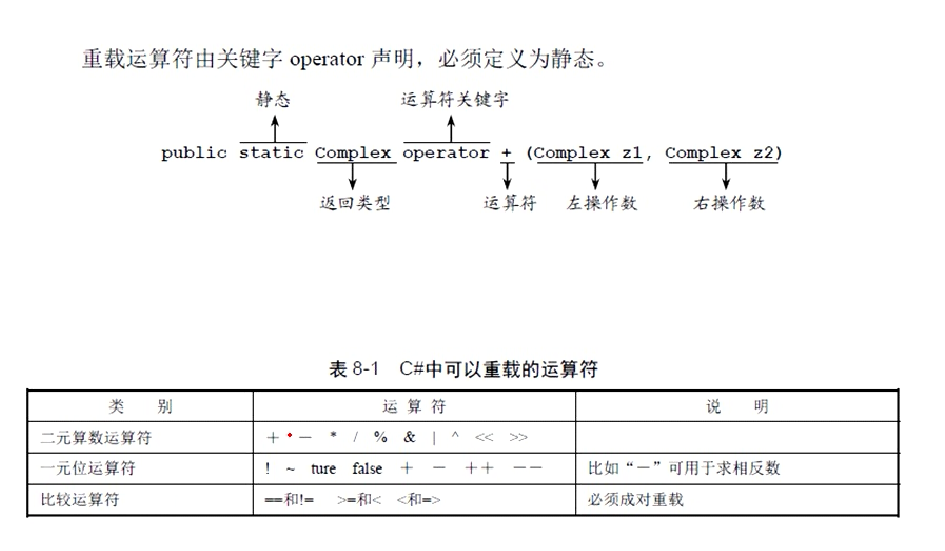昨天老丈人生日,祝他生日快乐,身体健康,洪福齐天!今天补上昨天学习的东西。
这几天学习有点慢,慢慢学习啦。现在在看C# 的中间件,我比较喜欢Cool 的编程界面!当年的VI
找到一个比较好的风格配置网站:http://studiostyl.es/不过要用代理上去,哈哈~~,继续学习!
zy31
1、理解什么是运算符重载。
2、掌握运算符重载的程序设计方法。
3、通过运算符的重载程序设计,进一步感受相关的面向对象编程思想。
namespace 运算符的重载
{
class program
{
static void Main(string[] args) {
Complex z1 = new Complex(73, 89);
Complex z2 = new Complex(21,16);
Complex z3 = Complex.Add(z1, z2);
//Complex z3= new Complex(z1.a+z2.a,z1.b+z2.b);
Console.WriteLine("z1+z2={0}+{1}i",z3.a,z3.b);
}
}
class Complex {
public double a, b;
public Complex(double real,double imagi){
a=real;
b=imagi;
}
public static Complex Add(Complex z1,Complex z2){
return new Complex(z1.a+z2.a,z1.b+z2.b);
}
}
}
namespace 运算符的重载
{
class program
{
static void Main(string[] args) {
Complex z1 = new Complex(73, 89);
Complex z2 = new Complex(21,16);
Complex z3 = z1 + z2;
//Complex z3= new Complex(z1.a+z2.a,z1.b+z2.b);
Console.WriteLine("z1+z2={0}+{1}i",z3.a,z3.b);
Complex z4 = z1 -z2;
Console.WriteLine("z1-z2={0}+{1}i", z4.a, z4.b);
Complex z5 = z1 * z2;
Console.WriteLine("z1*z2={0}+{1}i", z5.a, z5.b);
Complex z6 = z1 / z2;
Console.WriteLine("z1/z2={0}+{1}i", z6.a, z6.b);
}
}
class Complex {
public double a, b;
public Complex(double real, double imagi)
{
a = real;
b = imagi;
}
//加法
public static Complex operator +(Complex z1, Complex z2)
{ return Add(z1, z2); }
public static Complex Add(Complex z1, Complex z2)
{
return new Complex(z1.a + z2.a, z1.b + z2.b);
}
//减法
public static Complex operator -(Complex z1, Complex z2)
{ return Sub(z1,z2); }
public static Complex Sub(Complex z1,Complex z2)
{
return new Complex(z1.a-z2.a,z1.b-z2.b);
}
//乘法
static public Complex operator *(Complex z1, Complex z2) { return Multiply(z1,z2); }
public static Complex Multiply (Complex z1,Complex z2){
Complex z=new Complex(0,0);
z.a=z1.a*z2.a-z1.b*z2.b;
z.b=z1.b*z2.a+z1.a*z2.b;
return z;
}
//除法
static public Complex operator /(Complex z1, Complex z2) { return Divide(z1, z2); }
static public Complex Divide(Complex z1, Complex z2) {
Complex z = new Complex(0,0);
double denominator = z2.a * z2.a + z2.b * z2.b;
z.a = (z1.a * z2.a + z1.b * z2.b) / denominator;
z.b = (z1.b * z2.a - z1.a * z2.b) / denominator;
return z;
}
}
}

zy32
1、理解this关键字,并掌握this关键字在程序设计中的用法。
2、掌握数组在方法中的传递过程。
3、掌握数组在属性中的传递过程。
namespace this关键字
{
class program
{
static void Main(string []args )
{
Time time1 = new Time(2, 32, 23);
Console.WriteLine(time1.hour);
Console.WriteLine(time1.minute);
Console.WriteLine(time1.second);
}
}
class Time {
public int hour;
public int minute;
public int second;
public Time(int hour ,int minute,int second)
{
this.hour = hour;//this 意思:就是“对象”
this.minute = minute;
this.second = second;
}
}
}
namespace this关键字
{
class program
{
static void Main(string []args){
At ced = new At();
int[] arr2 = new int[] { 0, 1, 2, 3, 4, 5, 6, 7, 8 };
ced.Arr(arr2);
Console.WriteLine(ced.arr[3]);
}
}
class At
{
public int[]arr=new int[9];
public void Arr(int[] arr1)
{
arr = arr1;
}
}
}
namespace this关键字
{
class program
{
static void Main(string []args)
{
At ced = new At();
int[] arr1 = new int[] { 0, 1, 2, 3, 4, 5, 6, 7, 8 };
ced.Arr=arr1;
Console.WriteLine(ced.arr[3]);
}
}
class At
{
public int[] arr = new int[9];
public int[] Arr
{
//get {}//只读
set { arr = value; } //只写
}
}
}
zy33
1、如何定义和使用索引器。
2、了解索引器和对象数组的区别。
3、通过索引器访问离散字段。
4、了解ToLower()函数和null关键字。
5、通过本课的学习养成良好的编程习惯。
namespace study33索引器
{
class Program
{
static void Main(string[] args)
{
MyIndexer myindexer = new MyIndexer();
myindexer[2] = 22;
myindexer[4] = 44;
for (int i = 0; i <= myindexer.Length; i++) {
Console.WriteLine("myindexer[{0}]={1}",i,myindexer[i]);
}
}
}
class MyIndexer
{
private int[] arr = new int[5];
public int this[int index]
{
get {
if (index >= 0 && index < 5) return arr[index];
else return 0;
}
set {
if(index>=0&& index<5) arr[index]=value;
}
}
public int Length
{
get { return arr.Length; }
}
}
}
zy34
1、了解栈和堆,以及栈的内存存储形式。
2、了解栈和堆的关系、区别。
3、认识值类型和引用类型。
4、通过一个程序理解对象引用符,并知道对象引用符的用法。
5、实践操作一下类视图。
zy35
1、理解什么是继承,什么是基类,什么是派生类。以及它们的关系。
2、通过一个程序来编写基类和派生类,让理论升华到实践。
zy36
1、理解protected保护成员的用法。以及和private及public的区别。
2、如何在基类中定义虚方法和在派生类中重写虚方法。怎么使用虚方法。
3、了解重载和重写的区别。
zy37
1、掌握普通方法隐藏的程序设计。
2、利用base关键字调用基类方法。
3、掌握抽象方法和抽象类的程序设计。
4、如何密封类和方法。
zy38
1、掌握派生类中无参构造函数和有参构造函数的编程方法。
2、认识Object类,并掌握Object类中的ToString()方法的使用,以及重写该方法。
zy39
1、理解多态,掌握多态基本编程思想。
2、掌握is运算符的用法。
zy40
1、掌握基类转换为派生类向下类型的转换。
2、掌握as运算符的用法。
3、如何定义和使用接口。